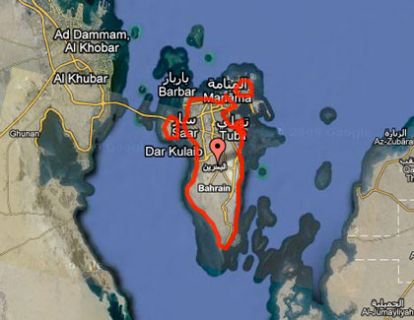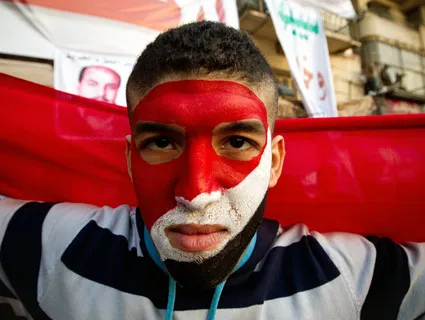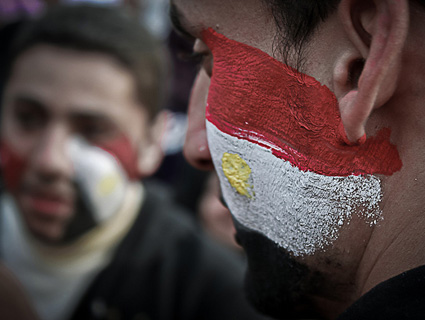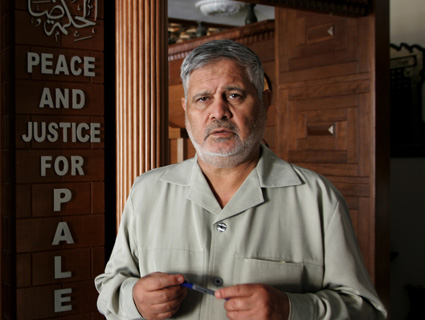
Black smoke billows from burning tents in Pearl Square. Manama, Bahrain, March 15, 2011.Wang Bo/Xinhua/Zuma
The following is a basic primer on what’s happening in Bahrain. You can also jump straight to today’s updates.
The hospitals of the tiny Gulf kingdom of Bahrain were packed with wounded after the military opened fire on large crowds of protesters and mourners on February 18.
Nabeel Rajab, a persecuted activist who directs the Bahrain Center for Human Rights, has been dodging tear gas, rubber bullets, and live ammunition as a leader of Bahrain’s pro-democracy uprisings. “People are very shocked that the king has ordered his troops to kill the people,” he told Mother Jones in a phone interview while leaving the funeral of a murdered protester. “It’s a sad time. I fear things are going to deteriorate.”
What follows is an overview of what’s brought Rajab and up to 10,000 other demonstrators onto the streets of this Gulf island—and led to the brutal crackdown on the 18th.
Bahrain at a Glance
Bahrain is home to 1.3 million people and located off the coast of Saudi Arabia. It has been ruled by the Sunni Muslim Al-Khalifa family for more than 200 years. Bahrain receives military aid from the US, provides logistical support for US troops in Iraq and Afghanistan, and hosts the US Navy’s Fifth Fleet. Its oil-driven economy has created concentrated wealth, particularly in Bahrain’s liberal, cosmopolitan capital city of Manama.
Yet the glitz and glamour of Manama’s skyscrapers and shopping malls mask the country’s grinding poverty and deep sectarian divides. The nation’s residential communities are starkly segregated— Sunni Muslims, westerners, Shiite Muslims, and South Asian migrant workers (who are not citizens but constitute almost half of Bahrain’s population) generally live in separate neighborhoods. The impoverished villages and slums surrounding Manama almost exclusively house Shiites. Shiites are culturally and ethnically distinct from Sunnis, and hold different interpretations of their Islamic faith. The majority—around 70 percent—of Bahrain’s citizens are Shiites.
Although some sympathetic, progressive Sunni Muslims are participating in the current uprisings, the vast majority of protesters are Shiites. (A small fraction, including Rajab, are of mixed Sunni and Shiite background.)
What sparked Bahrain’s uprisings?
The Feb. 14 “day of rage” launched via Facebook by Bahraini youth was, of course, inspired by the successful uprisings in Tunisia and Egypt. However, anger among Shiites in Bahrain had been bubbling for decades. For the past several years, Shiite youth in outlying villages have organized small scale protest riots that garnered little media attention.
In the early 2000s, some Shiite exiles returned to Bahrain after a new king instituted democratic reforms, including elections for a parliamentary advisory council. A few years later, however, the government resumed its aggressive censorship, intimidation, and torture of regime critics, most of whom are Shiite. One Sunni critic, women’s rights activist Ghada Jamsheer, was put under media blackout by the Bahraini government after blasting the regime’s Sharia’a courts in the Arab media. Time Magazine honored her as one of four “heroes of freedom” in the Arab world.
In the later half of 2010, the Bahraini government escalated is suppression of civil society. Authorities reportedly detained about 250 people, used torture to extract “terrorism” confessions, and closed numerous websites, publications, and non-profits that had criticized the government—including Rajab’s Bahrain Center for Human Rights. “All the time there are articles describing me as a traitor or a terrorist,” says Rajab. “For a human rights activist here, this is the environment.”
Faraz Sanei, a Bahrain specialist for Human Rights Watch, says that Rajab’s experience is part of a troubling trend. “There are very few independent human rights organizations in Bahrain today,” he said. “Most are essentially pro-government and are very close to the government.”
What do demonstrators want?
Earlier this week, Bahrain’s protesters were clamoring for equal political and legal rights, as well as protections against job discrimination. However, following the government’s lethal suppression, the protesters have hardened their demands. “Now they want to change the whole regime, instead of having reforms,” says Rajab. “I don’t know how we can accept a leader who killed his own people.”
How is this similar / different from Tunisia and Egypt?
In Egypt and Tunisia, Sunnis make up the vast majority of the population, and no major sectarian conflict drove the protests. Secularists, Islamists, Christians, the poor, the middle class, the wealthy, and ultimately even the army united against dictatorship. So far, the protesters in Bahrain have been overwhelmingly Shiite. Bahrain’s military is overwhelmingly Sunni and many of its soldiers harbor racist prejudices against Shiites. Bahrain arguably has much more in common with Iraq, a country with similarly stark divides between Sunni and Shiite communities.
What are the strategic implications for the US?
Bahrain’s western and Saudi allies fear that, if the Shiite majority gain full control of the government, this could strengthen their adversaries in Shiite-ruled Iran. (Shiites constitute a majority of citizens in only four countries: Iran, Iraq, Bahrain, and Azerbaijan.) Wikileaks cables revealed that Saudi and Bahraini leaders urged US officials to take military action against Iran’s nuclear program. The US considers its Fifth Fleet, which is hosted by Bahrain, to be an important counterbalance to Iran. Some Bahrainis have alleged that Saudi troops are helping to put down the uprisings.
On the eve of Secretary of State Hillary Clinton’s visit to Bahrain three months ago, Bahraini human rights organizations co-authored an open letter urging her to denounce the government’s escalating human rights abuses. (Rajab was one of the signers on the letter.) Clinton, however, chose not to publicly condemn a staunch US ally.
How do I follow what’s happening in Bahrain?
- Reporting and Analysis: The single best source for up-to-the-minute news is Al-Jazeera’s live blog from Bahrain. Also check out Nick Kristof’s gripping columns, videos, and blog posts. And be sure to follow the ongoing humanitarian investigations of Amnesty International and Human Rights Watch.
- Twitter: The Twitter feed of the Bahrain Center for Human Rights compiles news from various media outlets and individuals. Also keep an eye on the tweets of Mohammed Al-Maskati, president of the Bahrain Youth Society, and Thomas Mead, a New Zealand-based blogger collecting and retweeting accounts from eyewitnesses in Bahrain. For an anti-protester version of events, check out the stilted tweets of Bahraini state television.
-
Live Video: The BBC and Al-Jazeera are both running round the clock coverage of protests in Bahrain and across the Middle East.
The Latest:
UPDATE 1, Friday, Feb. 18, 3:50 p.m. EST/11:50 p.m. Manama (Siddhartha Mahanta): The US Embassy in Manama is advising Americans to stay at home until further notice. But, in a statement, they’re careful to note that no Westerners have been injured in clashes between protestors and the police.
UPDATE 2, Friday, Feb. 18, 3:55 p.m. EST/11:55 p.m. Manama (Siddhartha Mahanta): The White House has released a statement on the ongoing violence:
I am deeply concerned by reports of violence in Bahrain, Libya and Yemen. The United States condemns the use of violence by governments against peaceful protesters in those countries and wherever else it may occur. We express our condolences to the family and friends of those who have been killed during the demonstrations. Wherever they are, people have certain universal rights including the right to peaceful assembly. The United States urges the governments of Bahrain, Libya and Yemen to show restraint in responding to peaceful protests, and to respect the rights of their people.
UPDATE 3, Friday, Feb. 18, 4:30 p.m. EST/12:55 a.m. Manama (Ashley Bates): Anna Neistat of Human Rights Watch has issued a harrowing audio podcast from the “total mayhem” of a Manama hospital. She says at least 38 people were wounded after Bahraini security forces opened fire on protesters coming to pray near the Pearl Roundabout in Manama on Feb. 18. Human Rights Watch reports that security forces “not only attacked and used tear gas against people who were trying to escape live ammunition, but they then kept them from getting medical treatment.”
Human Rights Watch has called for the United States, the United Kingdom, and other international donors to immediately suspend military assistance to Bahrain. France has announced it will suspend exports of security equipment to Bahrain and Libya, and the UK government is “reviewing” its export of arms to Bahrain.
UPDATE 4, Saturday, Feb. 19, 10:45 p.m. EST/6:45 p.m. Manama (Ashley Bates): Thousands of protesters have reoccupied the capital’s Pearl Roundabout, the symbolic center of the anti-government protests, fighting past riot police who attacked them with tear gas and rubber bullets— but not live ammunition. Nicholas Kristof tweets, “Delirious joy in ‘Martyr’s Roundabout,’ as it’s now called. People kissing the ground. But the firecrackers made me jump.”
Bahrain’s king has appointed his son to lead a dialogue with the protesters. Obama has spoken by phone with Bahrain’s king, and the White House released a statement condemning the use of violence against peaceful protesters and urging democratic reform in Bahrain.
UPDATE 5, Saturday, Feb. 19, 5:35pm EST/1:35 a.m. Manama (Ashley Bates): Bahrain’s Crown Prince, who reportedly was responsible for the decision not to shoot protesters today, appeared on Bahrain TV with a message of reconciliation. Below is a translated video of his interview.
Al-Jazeera reports that “demands have hardened since the beginning of the week” and many protesters are no longer keen on negotiating with a monarchy that killed peaceful demonstrators. Some, however, are “asking for a constitutional monarchy, like in the UK or Australia.” Nicholas Kristof took this photo of protesters holding an English language sign calling for a constitutional monarchy and brotherhood between Sunnis and Shiites.
UPDATE 6, Sunday, Feb. 20, 2:35 a.m. EST / 10:35 a.m. Manama (Ashley Bates): Protesters camped out in Pearl Square overnight and were not attacked by riot police— a stark contrast to the live ammunition fired against sleeping protesters early Thursday morning. Bahraini activist Khalil Muhanna tweets, “Saw a Bahraini protester serve tea and breakfast to a Bahraini officer. No division here. God Bless.”
Meanwhile, Bahraini activists have launched an online petition campaign to help protect Nicholas Kristof against the Bahraini regime’s attempts to censure and expel him. The statement praises Kristof for “bringing to the rest of the world a factual image of the brutal manner in which the authorities are seeking to crush peaceful demonstrations,” and faults Al-Jazeera for being “much muted in its reporting of the human rights abuses taking place in Bahrain.”
UPDATE 7, Sunday, Feb. 20, 12:30 p.m. EST /8:30 p.m. Manama (Ashley Bates): Current reports from Bahrain describe an atmosphere of calm and jubilation, with some protesters picnicing and roasting fish. The Associated Press interviewed some of the thousands of women who have joined the demonstrations. Opposition leaders in Bahrain plan to negotiate with the government, against the wishes of many protesters, who are demanding that the government step down.
Pro-democracy uprisings continue to sweep the Arab world, and the worst violence appears to be taking place in Libya. The BBC reports that Colonel Muammar Gaddafi’s troops used machine guns and large-caliber weapons against protesters in Benghazi, the country’s second-biggest city. The details of this bloodbath are slowly leaking out from behind Libya’s information blockade. Doctors told the BBC that more than 200 protesters have been killed. (Click here to follow Mother Jones‘ coverage of the Libyan uprising.)
UPDATE 8, Monday, Feb. 21, 7 p.m. EST / 3 a.m. Manama (Ashley Bates): Protesters continued to demonstrate in Bahrain’s Pearl Roundabout on Monday, but there were no major confrontations with government troops. Under pressure from protesters, opposition leaders accepted, then declined, the government’s offer for dialogue, saying they needed more time to formulate their agenda and agree on their demands.
UPDATE 9, Tuesday, Feb. 22, 5:45 a.m. EST 1:45 p.m. Manama (Ashley Bates): Bahrain’s Grand Prix auto races have been cancelled due to the political unrest. Al-Arabiya reports that the king has pardoned 25 dissidents charged with plotting to overthrow the regime. Nick Kristof has authored a probing blog post reflecting on his discussions with mostly Shiite protesters in the Pearl Roundabout and asking, “Is this Apartheid in Bahrain?”
UPDATE 10, Wednesday, Feb. 23, 7:30 p.m. EST 3:30 a.m. Manama (Ashley Bates): Here’s a roundup of the latest news from Bahrain:
- On Tuesday, a massive, packed crowd of more than 100,000 demonstrators converged on the Pearl Roundabout, in what organizers have called the largest ever pro-democracy demonstration in Bahrain. The New York Times reports that “the goverment seems to have accepted that violence will not silence the opposition and has shifted its strategy. It has set up a press center to get its message out and is working with a public relations firm.”
- A new Democracy Now segment chronicles multiple incidents in which the US military has stonewalled attempts by Bahraini activists, including Nabeel Rajab, to speak with US government officials about alleged human rights abuses committed by the government.
- A popular Bahraini activist and blogger, who was released from jail six months ago, is urging divided opposition groups to quickly unite and agree on their demands.
- Moody’s has put its bond ratings for the Bahrain government under review, and specifically expressed concern about Bahrain’s banking sector, which dominates the country’s economy. “Potential liabilities stemming from the banking sector in a systemic crisis could … present a significant challenge to the authorities,” Moody’s said.
- Formula One is expected to lose an estimated $100 million dollars in revenue from the cancellation of the Grand Prix in Bahrain. The largest protests are taking place within a few blocks of the race circuits.
- Bahrain’s king arrived in Riyadh, Saudi Arabia on Wednesday, presumably to discuss Bahrain’s political and economic crisis. Saudi Arabia is a close ally of Bahrain.
UPDATE 11, Friday, Feb. 25, 11:40 a.m. EST 6:40 p.m. Manama (Nick Baumann): Tuesday’s protests brought about one in every six people in Bahrain into the streets. Today, Shadi Hamid says, “it’s even more”—”the largest pro-democracy protest in [the country’s] history.”
Update 12, Wednesday, March 16, 2:05 p.m. EST 9:05 p.m. Manama (Ashley Bates): Many troubling updates from Bahrain:
- Bahraini security forces on tanks, helicopters, and jeeps launched a full-scale assault on protesters in the Pearl roundabout and the financial district of Manama early Wednesday, a day after the king declared a three month state of emergency martial law. Witnesses said at least two protesters were killed, and state television reports that two policemen died after being hit by a vehicle. Riot police lobbed volleys of tear gas onto the camps of protesters who for weeks have staged a sit-in at the Pearl roundabout. According to the government, no live ammunition was used. A curfew has been set for 4 p.m. to 4 a.m. in parts of Bahrain, and protests, marches and sit-ins have been banned across the kingdom.
- The army has reportedly taken over the Salmaniya Hospital, which had became an opposition stronghold. A doctor told the New York Times, “Doctors are being attacked and asked to leave at gunpoint. The army has control of the roads and questions any movement.” The doctor said that makeshift first-aid areas were being set up in mosques and private homes.
- Bahrain’s largest Shi’ite Muslim opposition group, Wefaq, is urging its followers to avoid any confrontation with security forces, an official in the group said Wednesday. “Wefaq has advised people since this morning to avoid confrontation with security forces and to remain peaceful,” the official said, adding that the group had not organized any protest for Wednesday.
- Four high ranking government officials have resigned over the government’s crackdown on protesters.
- Bahrain’s Ministry of Education announced it’s shuttering all government and private universities, schools, nursery and all educational institutions until further notice.
- Many Bahraini residents were taking shelter behind closed doors on Tuesday after reports that masked youths were attacking their neighborhoods. Some communities set up checkpoints at the entrance to their neighborhoods for safety.
- On Tuesday, hundreds of protesters marched to Bahrain’s Saudi Arabian Embassy, denouncing the recent involvement of 2,000 Saudi troops.
- A source close to the ruling Al-Khalifah family told the BBC that the Crown Prince was close to reaching a breakthrough with pro-democracy activists on Sunday. However, the Al-Khalifah family is divided on how to handle the uprisings. The Crown Prince is seen as a moderate willing to talk to protesters, while his uncle, who’s served as prime minister for more than 40 years, is a hardliner. The king is reportedly somewhere in the middle.
- Yesterday Mother Jones published Nick Turse’s expose, which originally appeared on the TomDispatch website, about U.S. “excess” arms gifts to Bahrain, including supplies of live ammunition that the Bahraini government has reportedly used against protesters.
Update 13, Thursday, March 17, 4:05 p.m. EST 11:05 p.m. Manama (Ashley Bates): A roundup of today’s news from Bahrain:
- The video above, apparently from Wednesday’s crackdown, seems to show Bahraini security forces shooting an unarmed man in the chest with a tear gas canister. After the man collapses, they shoot him again with a canister, this time in the head. Despite this blunt trauma, the man reportedly survived. Other gruesome, harrowing footage, such as this video said to show a deceased protester at the hospital, has surfaced on YouTube.
- Bahraini authorities arrested six top opposition figures in the early hours on Thursday. A leading opposition figure, Khalil Almarzooqm, said Thursday that government security forces were attacking villages and towns. He said government forces were preventing doctors at Salmaniya hospital from treating the wounded. One doctor was allegedly pulled out of surgery. The situation at the hospital is “a crime against humanity,” Almarzooq said.
- Navi Pillay, the UN rights chief, said in a statement she was “deeply alarmed by the escalation of violence by security forces in Bahrain, in particular the reported takeover of hospitals and medical centres.” She continued, “Governments are obliged to protect the rights to life and health of the people, but we are hearing very credible reports indicating that they are in fact obstructing access to such rights.” Pillay’s office has received calls and emails from individuals in Bahrain, who are “terrified about the armed forces’ intentions.”
- William Burns, the undersecretary of State for political affairs, told a Senate panel in prepared testimony Thursday that the stakes in Bahrain requires more than restoring law and order, and that real political grievances between the Sunni monarchy and Shiite majority must be addressed. President Barack Obama called the kings of Saudi Arabia and Bahrain and urged them to exercise “maximum restraint” with protesters.
Update 14, Friday, March 18, 1:50 p.m. EST 8:50 p.m. Manama (Ashley Bates): Eerie calm, grief, and trepidation in Bahrain:
- On Friday, in what Bahrain’s official news agency termed “a facelift,” security forces tore down the the pearl at the center of the Pearl Roundabout. The monument had become a symbol of the anti-government protests. On Thursday, workers using bulldozers and dump trucks had removed the remnants of the tent city that protesters had set up in Pearl Square, and troops in armored vehicles remained stationed at roads leading into the area.
- Manama’s streets were quiet Friday morning. The highway that leads to the city’s Pearl Roundabout, which was clogged with protesters and security forces days earlier, was clear.
- Hundreds of Bahrainis gathered on Friday to bury an activist named Ahmed Farhan who was killed in Tuesday’s crackdown on mainly Shi’ite Muslim protesters. No security forces were present, but military helicopters circled above.
- Despite the arrests of more opposition leaders on Thursday, Shiite preachers at noon prayer on Friday called for ongoing nonviolence. “The peaceful approach has been our choice since day one,” Sheik Issa Qassem, the top Shiite clergyman in Bahrain, said in his sermon. Opposition activists told a news conference they would press on with peaceful resistance, holding a sit-in inside the mosques after Friday prayers, standing outside their homes at certain hours and flying the flag from their rooftops. Opposition activists will also call “Allahu Akbar,” or God is Great, from their rooftops every night in peaceful resistance.
- Eighteen councilors representing the opposition group Al Wefaq have suspended their membership on four municipal councils over the government’s crackdown on protests.
- The Bahraini government on Thursday denied reports by human rights organizations, including Amnesty International, about its use of “systematic excessive force” against protesters, and described arrested opposition leaders arrested as “instigators looking to topple the regime.”
Update 15, Saturday, March 19, 5:05 p.m. EST 12:05 a.m. Sunday Manama (Ashley Bates): A fourth protester has died of wounds sustained during the Bahraini government’s Wednesday crackdown. That brings the number of protesters killed since the start of the unrest to 11, according to Bahrain’s largest Shia Muslim group, Wefaq. On Saturday, the government eased the military curfew by four hours (the new curfew is 8 p.m. to 4 a.m.) and encouraged people to return to work.
Reuters has published a tragic profile of one of the slain protesters, 30-year-old Ali Farhan, who was shot by security forces in the back of the head. Farhan dreamed of having a wife and family, but never moved out of the three rooms of concrete slabs and sheet metal that housed him and 10 other family members. He participated in the protests, his sister said, because the discrimination and repression suffered by the Shia community in Bahrain was “too much to bear.”
Update 16, Tuesday, March 22, 7:42 p.m. EST 2:05 a.m. Wednesday Manama (Ashley Bates): Grim details continue to emerge, protesters are weighing their options, and Bahrain’s government is attributing the unrest to foreign, sectarian plots:
- Nabeel Rajab, head of the Bahrain Center for Human Rights (who is featured at the start of this article), told CNN that he was handcuffed, blindfolded and beaten when authorities detained him for about two hours. The United Nations Human Rights Office said that over the past week alone, between 50 and 100 people have been reported missing. Two who had earlier been missing now have turned up dead.
- On Tuesday, mourners buried a woman who was shot in the head while driving near a military checkpoint. Human rights groups say that 20 people have died in Bahrain since protests began on Feb. 14.
- Regional Shiite / Sunni tensions could be mounting. Bahrain’s king claims the kingdom has foiled a “foreign” plot to destabilize it. He said the plot had been in the making for more than two decades. While he did not name a specific “foreign” country, he is widely believed to have been referring to Shiite-dominated Iran. The Bahraini government also warned citizens on Tuesday not to travel to Lebanon for their own safety, because the Iranian-backed Shiite Muslim group Hezbollah supported the protesters and condemned the crackdown.
- Bahrain’s interior ministry said that security across the kingdom was “stable” amid a heavy police presence, and that the Salmaniya Medical Complex has been “secured and is providing normal medical services.” The ministry alleged that the “hospital was open for everyone.”
- U.N. spokesman Rupert Colville, however, said his office is receiving reports of people speaking to the media being detained and threatened. “Those arrested are reported to include political activists, human rights defenders and doctors and nurses from the Salmaniya hospital,” Colville said. “Some, including female nurses, have been released quite quickly; others have not. Many of those who have been reporting on the situation to the outside world, including to us, have had their communications cut, and in some cases, the mobile phones of their close relatives have also been cut off.”
- The opposition appears to be discussing its next moves. Bahrain’s government on Sunday said that it regretted the “negative” response by opposition groups to an offer of dialogue. The opposition said that it would not be “coerced” into talks. Bahrain’s largest opposition group has voiced support for a nationwide strike in solidarity with anti-government protestors. “The strike is valid as workers are afraid to step out of their homes due to increasing checkpoints put in place by authorities. Some evidences show that workers and residents are subjected to harsh treatment and harassment at these check points,” Al Wefaq National Islamic Society posted in a statement.















